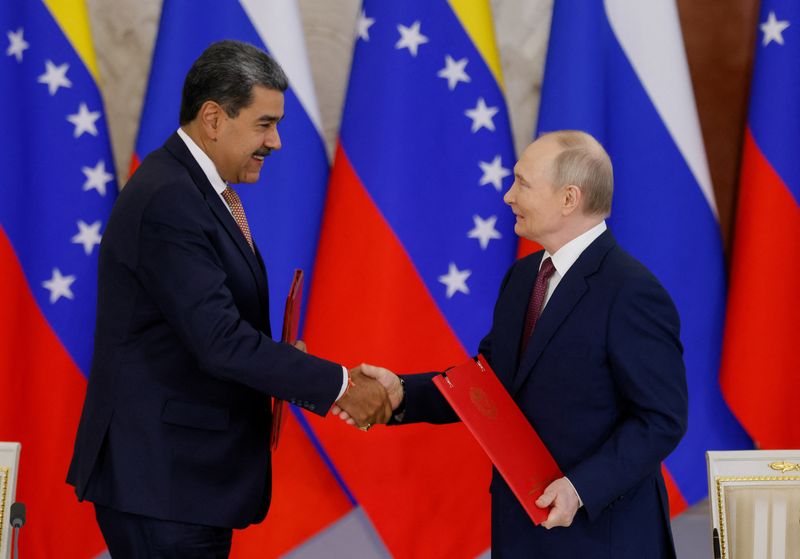Moscow, May 7, 2025 – Russian President Vladimir Putin and Venezuelan President Nicolás Maduro signed a landmark Strategic Partnership and Cooperation Agreement on May 7, 2025, during a ceremony at the Kremlin, broadcast on Russian state television. The agreement, described by Kremlin spokesman Dmitry Peskov as a “weighty, substantial, and very important framework document,” aims to deepen ties between the two nations amid shared tensions with the United States and the West. The signing, coinciding with Maduro’s visit for the 80th anniversary of the Soviet victory over Nazi Germany, underscores a growing alliance focused on energy, security, and countering Western influence. Posts on X, such as @SprinterObserve’s, hailed the pact as part of a “new axis of alliances” in global geopolitics.
Details of the Agreement
The strategic partnership, finalized after talks on May 7, builds on over 300 existing bilateral agreements and sets a roadmap for cooperation through 2030. Key elements include:
- Energy Collaboration: The agreement prioritizes joint initiatives within OPEC+ and the Gas Exporting Countries Forum, focusing on oil and gas exploration technologies. Russia, a key supplier of petroleum expertise to Venezuela, aims to bolster Caracas’s struggling oil industry, which holds the world’s largest proven reserves but has seen production drop to under 1 million barrels daily due to sanctions and mismanagement.
- Security and Defense: Building on November 2024 pacts signed in Caracas, the agreement includes intelligence-sharing, counter-espionage, and drone technology cooperation. Russia pledged to supply Venezuela with advanced military equipment, per The Moscow Times.
- Economic Ties: Trade surged 70% in early 2024, with Russian exports to Venezuela up 453%, per RIO Times. Russia now provides wheat and insulin, becoming Venezuela’s third-largest wheat supplier in Latin America.
- Global Advocacy: Both nations committed to promoting a “multipolar world order,” opposing U.S. sanctions and unilateralism. The agreement emphasizes coordination at the UN and other platforms to combat terrorism, extremism, and historical revisionism, per TASS.
The leaders also discussed financial and healthcare cooperation, though specifics remain undisclosed. Maduro’s attendance at Moscow’s Victory Day parade on May 9, marking the Soviet triumph in World War II, further symbolizes their alignment.
Context and Motivations
The agreement reflects a deepening Russia-Venezuela alliance amid mutual isolation from the West:
- Russia’s Geopolitical Strategy: Since its 2022 invasion of Ukraine, Russia has faced Western sanctions and sought partners among nations critical of the “collective West.” Strategic pacts with China, North Korea, and Iran since 2022 mirror this approach. Putin’s support for Maduro, including recognizing his disputed 2024 election victory, strengthens Moscow’s foothold in Latin America, a region historically under U.S. influence.
- Venezuela’s Economic Crisis: Facing U.S. sanctions and a collapsed economy, Maduro relies on Russia for oil technology, military support, and diplomatic backing. Trump’s January 2025 ban on Chevron operations in Venezuela, cutting a key revenue source, has pushed Caracas closer to Moscow.
- Shared Ideology: Both leaders advocate a multipolar world, with Maduro declaring at the 2024 BRICS summit in Kazan that “BRICS is the epicenter of global changes.” Putin echoed this, stating the partnership serves “our nations’ development interests.”
The agreement, first proposed by Putin during a March 14, 2025, video call marking 80 years of diplomatic relations, was finalized after months of negotiations.
Reactions and Implications
The signing has drawn global attention:
- Domestic Support: Russian state media and Venezuelan Vice President Delcy Rodríguez praised the pact as “crucial for safeguarding national sovereignty.” X posts, like @upholdreality’s, framed it as a bold step toward cooperation.
- Western Criticism: The U.S. and Latin American nations backing Venezuelan opposition candidate Edmundo González, who claimed victory in the 2024 election, view the pact as legitimizing Maduro’s regime. A Bloomberg report noted concerns about Russia’s military support escalating regional tensions.
- Regional Dynamics: Venezuela’s neighbors, like Brazil and Colombia, remain cautious, balancing ties with both the U.S. and Russia. The pact could strain relations, especially after Venezuela’s 2023 Essequibo dispute with Guyana, which Putin and Maduro discussed in 2023.
The agreement may boost Venezuela’s oil output and stabilize its economy while enhancing Russia’s influence in the Americas, potentially challenging U.S. dominance. However, critics warn that Venezuela’s reliance on Russian aid risks long-term dependency, with limited economic diversification.
Skeptical Perspective
While the agreement is touted as a game-changer, its impact may be overstated. Russia’s commitments, including military and oil technology, echo past unfulfilled promises, as Venezuela’s oil production has stagnated despite Russian support since 2019, per Reuters. The lack of transparency—Peskov’s refusal to detail the pact’s specifics—raises doubts about its enforceability. Maduro’s domestic challenges, including protests over his 2024 election, could limit his ability to implement agreements, while Russia’s focus on Ukraine may divert resources. Conversely, the pact’s energy focus aligns with global oil market needs, and Russia’s wheat and insulin supplies address Venezuela’s immediate crises, suggesting tangible benefits. The true test lies in execution, particularly amid U.S. sanctions tightening on both nations.
Conclusion
The May 7, 2025, Strategic Partnership Agreement between Putin and Maduro marks a significant step in Russia-Venezuela relations, uniting two sanctioned nations against Western influence. By prioritizing energy, security, and a multipolar vision, the pact aims to bolster Venezuela’s economy and extend Russia’s geopolitical reach. As Maduro joins Moscow’s Victory Day celebrations, the world watches a partnership that could reshape Latin American dynamics, though its success hinges on overcoming practical and political hurdles. For updates, follow Reuters, TASS, or The Moscow Times.
Sources: Reuters, The Moscow Times, TASS, Bloomberg, RIO Times, posts on X
